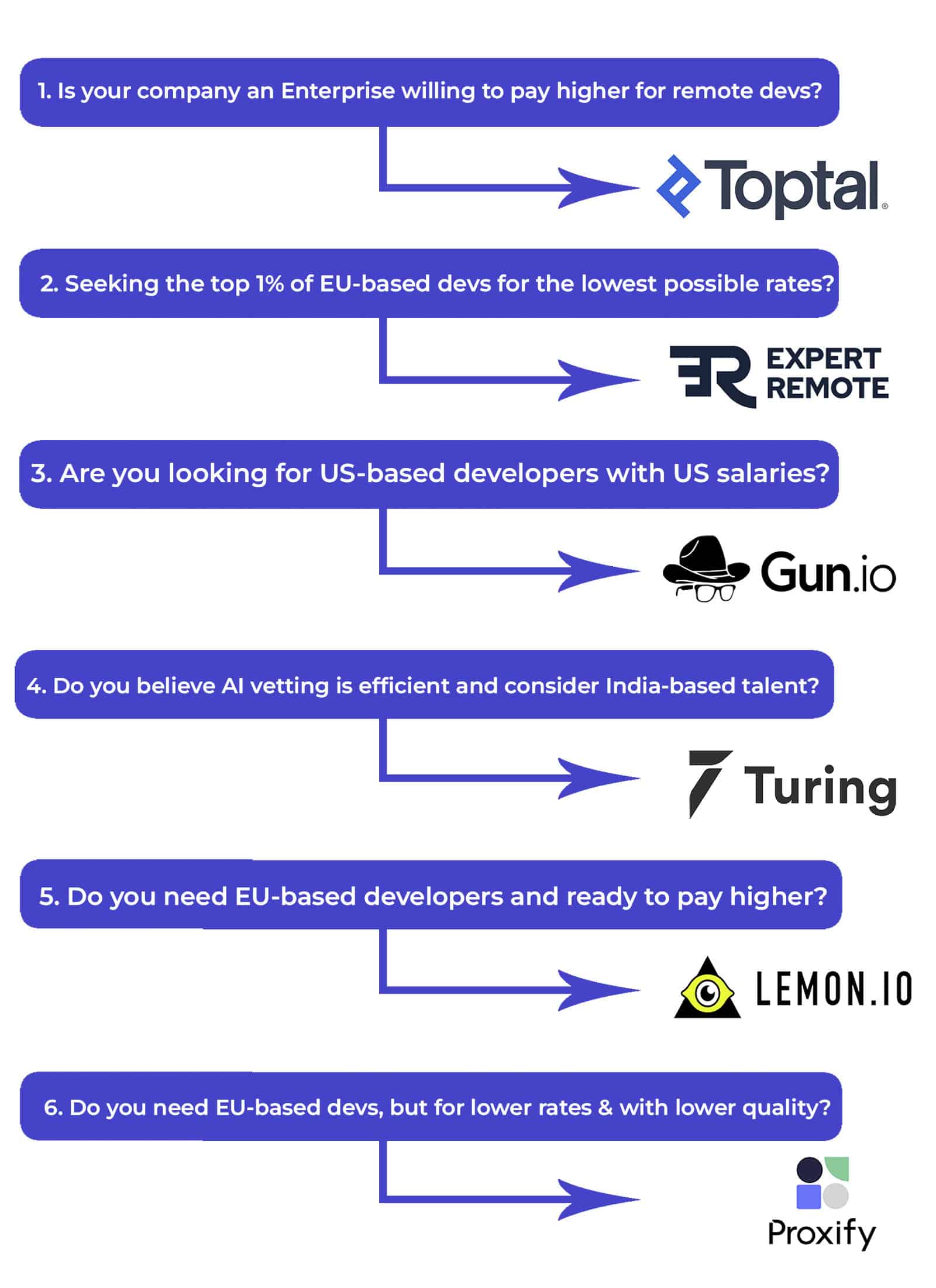
21 min read
How to Hire React Developer: A Complete Guide
ReactJS (do not confuse it with React Native) is a JavaScript library for building reach user interfaces. Firstly created in 2011 by Jordan Walke, a Facebook software engineer, the library then was picked up by the Facebook team who started investing in it. They made the technology open source in 2013 to help others build apps and websites faster.
There’re other similar technologies out there, but React is the most used one today in web application development at scale. According to StackOverflow Trends, ReactJS has a far higher popularity among other UI libraries and frameworks with a substantive growth trend for the last few years. The numbers of downloads compared tell us the same.
Challenges of Hiring React Developers
You might ask, what’s the problem to hire React developers, taking into account its extreme popularity? There are definitely hordes of experts in the market looking for a job!
The problem lies in the high complexity and diversity of ReactJS, as well as in supply and demand. The supply is huge because it’s easy to start with React and there are plenty of jobs. So, newcomers rush into the gate. The demand is also huge because everyone needs experienced developers with React knowledge.
What’s the problem then? Well, the key is “experienced”. Finding a developer who is very experienced, with hands-on knowledge of React, strong communication, and team skills, who can support a conversation in English, and who has a proper work attitude. Well, this is when it becomes a challenge.
But these are just common words. Let’s briefly define the challenges and make them systematic.
1. Competition with enterprises and cash machines
Even if you run a prospering business with enough resources, there are always even bigger companies with greater resources exist. Yes, this isn’t always a “bloody war for resources” but if your competitor can and have the will to allocate more resources, you’ll have to raise the stake and spend the same, or you’ll highly likely fail the competition for new staff.
2. Costs higher than expected or affordable
The case described right above usually results in the fact that the cost to hire React developers exceeds the permissible values.
For small and micro businesses this situation is quite common. Small companies often have no HR in staff, they haven’t subscribed to different helpful hiring services, and their insufficient hiring skills along with low technical expertise raise their spending even more. In some cases, it makes the process totally unprofitable.
3. Lack of own expertise to make the right decision
Insufficient expertise leads not only to extra spending but also to wrong decisions. Once you hire an expert, you definitely should have an expert with the same or higher experience in the field to examine the first one. Otherwise, you’ll highly likely hire the wrong person with all the dire consequences.
4. Insufficient experience to manage everything right
Hiring management is quite a challenging process. Aiming at the best possible outcome, you’ll have to process dozens or even hundreds of applicants to find one or a few of the most fitting of them. Without special skills, it could be near impossible to make it efficiently and not fall into a total mess.
5. You have less time than required to hire the right person
In today’s world where remote work reigns, the rules of the game have changed drastically. On one side, you have an access to the global talent market. You can hire wherever you want and you consider it convenient for your business. On another, companies from all over the world have the same opportunities.
So, what happens? The average hiring process covers thousands of applicants. And each applicant applies for hundreds of positions globally. This seems like a terrible HR overhead. And the fact is that the process becomes much longer, up to years (this isn’t an exaggeration).

A Complete Guide for Non-technical Professionals to Hire React Developers
Okay, if you are still confident in your abilities, let’s find out how to do it in the right way. This guide will help you reduce your chances to fail in hiring the right React developer.
React Developer Job Description
“Plans are nothing; planning is everything.” © Dwight D. Eisenhower.
Everything starts with planning. Or, in our case, with a good job description. Before you rush into sourcing and reviewing candidates, think about that: how are you going to sell them your company?
We’re in a candidate market, not the company market. The best developers go work for Google. So, how exactly are you better than Google, Facebook, or Snapchat? We know that’s a tough question. But you have to answer it to convert the best candidates into your team members.
Some of the values you’re looking for lie in statements of mission, vision, and unique sales proposition of your business. Think about them creatively: how they can be helpful right for your staff not only for business, users, humanity, or the universe in common?
But let’s delve deeper and decompose the job description into parts.
1. Business self-positioning
For better self-positioning, answer some typical questions about your business in common and the project particularly.
About the project you’re hiring ReactJS developers for:
- What problems are you trying to solve?
- How exactly are you trying to solve them?
- What are you doing differently? Sell your vision.
About some proof of your competency:
- Have you been in the industry for a while and know all ins and outs?
- Do you have a CTO who worked at Google before your startup?
- Have you raised some funding already?
- Does your MVP show some good metrics?
- Describe your background and traction.
- Are you hiring for some well-known company? Talk about the company’s achievements.
Write the answers down in a short paragraph, then form a finished text piece understandable enough for your potential employees. Avoid using what is called “a marketing bullsh&t” to cloak the lack of factual information.
2. Key responsibilities
Here’s a list of the most common React developer responsibilities that are common for most front-end or JS developers, too. Feel free to borrow.
Technical responsibilities:
- Set up a front-end project architecture
- Build reach and intuitive user interface according to designs/wireframes
- Make the user interface responsive to different screen sizes
- Optimize the application performance
- Customize the application for different browsers
- Build user authentication
- Integrate front-end with back-end RESTful APIs
- Create ReactJS components.
Non-technical responsibilities:
- Communicate with other team members: back-end developers, designers, product managers, etc.
- Provide ideas on user interface improvements
- Write proper code documentation.
3. Technical knowledge
You should pay special attention to which technologies to describe and how to do that. Developers get pissed off all the time by silly mistakes made by non-technical recruiters when describing the technical requirements. So, just copy the below list for a senior ReactJS developer talent position:
- Excellent knowledge of JavaScript, HTML, CSS, RESTful APIs
- Minimum 5 years of commercial experience as a front-end developer
- At least 1 year of hands-on experience with ReactJS
- Experience with Angular or Vue will be a plus
- Deep understanding of ReactJS fundamentals: virtual DOM, JSX, events, etc.
- Hands-on experience with Redux, Flux, Next.js, Webpack, Enzyme
- You should understand how to set up CI/CD, some DevOps basics, unit testing with Mocha or Jest, npm packages
- A degree in Computer Science will be a plus
- Some back-end experience or knowledge of other programming languages will be a plus, too.
4. Soft skills
Soft skills are highly important for every role in the project team. Simply put, a middle-level developer with good soft skills is better than a senior developer with bad soft skills. Communication, English level, work attitude, and teamwork — aren’t less important than tech frameworks knowledge. Especially if we speak about startups, where communication is a core of success.
- Communication. Front-end developers work closely with back-end developers, designers, product/project managers, etc. Yes, hiring developers, you must know that most of them are introverts. But those of them who are great have learned how to collaborate with other team members effectively. Otherwise, your software development time and costs can easily increase multifold.
- English proficiency. You don’t need your developer to reсite Shakespeare. But again, they should be able to support day-to-day conversations on technical and other project-related topics with no risk of serious misunderstanding.
- Work attitude. Ideally, you need people on your team who can take full responsibility for certain parts of the project. You’re looking for self-sufficient, responsible developers. They will deliver features according to estimations or raise concerns early on. They will understand business problems and come up with their own technical solutions. They will own features end-to-end. Not just coders but problem solvers!
- Leadership & people skills. When you start a new project, the first ones whom you should hire must be leaders. You’re looking for one senior front-end and one senior back-end developer. First, they will build a core of your system in the first 3–4 months. Second, when you start growing the team they will do the interviews and serve as gatekeepers. Third, when new team members come on board, they will lead them. The first 2–3 hires will set the tone of your team. So, make sure they are not just experienced developers but have excellent people skills as well.
- Company culture. If you’ve already got the team you need to make sure new developers fit in. Start by describing your company and team values. Is it hard work? Is it smth else? Then bring someone else from your team to the interview, and take their feedback on the candidate. It’s important that your existing team members like your new developer. Actually, it’s probably the most important thing.
5. References
Don’t forget to check the references. We know, it takes time but it can save you from making a hiring mistake. Visit Linkedin and try to contact the candidate’s previous employer. At Expert Remote, we always check references.
An important note: don’t try contacting the current employer without getting permission from a candidate, it is opposite the hiring ethics and can be harmful to the candidate’s career!

Where to Find ReactJS Developers: In-House vs IT Outsourcing/Outstaffing vs Freelance Marketplaces vs Vetted Developer Marketplaces
Well, there are plenty of options. You can recruit in-house. Or you can go to the freelance marketplace or an IT outsourcing/outstaffing firm, or choose any other option. This part describes the pros and cons of these approaches.
1. In-house
Hiring in-house seems to be more stable because you have employment contracts with your developers. But in reality, after Covid, many developers got two jobs, sometimes even two full-time jobs simultaneously. So, it’s not that stable anymore. On the contrary, you need to pay recruiters and it takes a couple of months to source and vet developers. Then you’ve got additional costs: taxes, office, benefits, etc.
Today, full-time employees work remotely anyway. So, if you decided not to limit yourself to a single city or country, and tap into a global talent pool, below are your main options.
2. Traditional IT outsourcing and outstaffing firms
There are myriads of companies across the globe that can help you build an onshore, nearshore, or offshore team. This model has been valid for dozens of years, so, it still works. You just need to find the right partner. Though, after Covid, it started to break down.
Outsourcing and outstaffing companies usually limit themselves to a single country or several countries where they’ve got brick&mortar offices. But today’s startups go global from day one. And traditional outsourcers struggle because:
- They aren’t used to sourcing talent globally
- They have ineffective operations which translate into heavy margins for clients
- They don’t know how to work in a remote-first world.
3. Freelance marketplaces
Freelance websites are at the opposite end of the spectrum in terms of remote work, being much better prepared. Moreover, the prices offered are often nice. But the quality of talent is much lower compared to IT outsourcing or outstaffing firm. There are several reasons:
- Bidding. Most of the marketplaces have a “bidding” model. Clients post projects and developers place their bids. This drives prices down. But attracts lower-skilled labor. Skilled professionals can’t compete with juniors from India. And they don’t need to, because companies are chasing them, not the opposite.
- Gig-work. Marketplaces focus on part-time short-term projects. But experienced people are looking for careers and at least for something longer. Our own research shows that when great engineers go to marketplaces, they get discouraged pretty quickly.
- Unverified profiles. Anyone can sign up, create a profile and write whatever he/she wants. Then take on a couple of lower-paid jobs to get first ratings and that’s it. You can be a senior developer with no rating or a junior developer with an exceptional freelancer profile. The problem is that nobody verifies these profiles.
But if you’re looking for the cheapest and the quality is not a concern, Upwork will be your best choice. Yes, sometimes early-stage startups just need to build a prototype or a proof of concept to test the idea. And I’m not saying that you can’t find great developers on Upwork. It just won’t be easy, fast, and cheap.
4. Vetted developer marketplaces
There is a relatively new business model on the block. They refer to it as vetted developer marketplaces, global developer communities, IT outstaffing platforms, or Talent Clouds.
These terms are all the same. The idea is that developers are sourced globally from day one. And they undergo a rigorous vetting process that shortlists the candidates to a narrow pool of exceptional talent. These companies do the sourcing with marketing, vetting is half-automated and some of the ops are automated too. This creates efficiency at scale.
The best companies in this niche are:
- Toptal
- Expert Remote
- Turing
- Gun.io
- Proxify
- Uplers
- Arc.dev
- Lemon.io
And the list is growing. They differ by approach to vetting, stage of the business, customer focus, platforms, and rates. Here are some valuable tips on how to make the right choice:
- If you’re an enterprise company ready to pay $75–$150/h, use Toptal.
- If you’re a US-based fast-growing scaleup that believes in AI vetting, use Turing. They’ve got lower rates than Toptal but still good quality, and a huge talent pool.
- If you’re a US-based small startup ready and want to work with the same size company, plus talk to US-based sales/account managers, and ready to pay for it $100–$150/h rates, check Gun.io.
- If you’re a series-A startup in Europe, looking for middle-senior engineers with $40–$80/h rates, consider Lemon.io.
- If you’re a pre-seed/seed startup in Europe, looking for middle engineers with lower $35–$50/h rates, your choice is Proxify.io.

But if you love this article, go to Expert Remote. With no jokes, here are some whys:
- Tier-1 tech talent. We neither believe in automated vetting nor traditional recruiting. Instead, we have ex-Google, ex-Facebook, and ex-Uber engineers in our network who by conducting interviews serve as gatekeepers to our boutique community. 40% of members come through referrals, and the other 60% are sourced with marketing and vetted by our existing community members.
- Remote team expertise. Before starting Expert Remote the founders ran a traditional IT Outstaffing firm in Eastern Europe. We’ve spent the last decade building and scaling remote teams for early-stage startups.
- Unicorn clients. We can proudly say that some of these early-stage startups over time became scale-ups and unicorns. We know the secret sauce ;)
- Startup mentality. Founders themselves built several startups. By being on both sides of the fence we deeply understand how to make your company succeed.
- Personalized approach. We’re not that big yet. It allows us to work closely with our clients. Problems are solved faster when you can call the founders.
- Reasonable costs. Because of effective operations, we have 1.5–2x lower margins than the industry average. That allows developers to earn more and clients to pay less at the same time.
So, if you’re an early-stage (pre-seed, seed, series A) startup looking to expand your development team for reasonable rates, we can help. If you need advice on how to set up a team of remote React developers, make it effective, and scale it, let’s talk.
How Much Does It Cost to Hire a React Developer?
Now that we explored the hiring models let’s get to the point. What countries to go to and what prices to expect?
According to talent.com, in the US you can expect to pay $100k–$150k/year for a ReactJS developer. The median salary is $117,500/year. Billed hourly, a middle ReactJS developer will cost you ~$60/h and a senior ReactJS developer will cost you ~$75–$80/h.
It’s just a gross salary. If you add recruiting and additional monthly costs it will be $90–$120/h minimum. And in Silicon Valley expect the rates to be 1.5–2x higher.
When you look offshore, hourly rates start at $20–$30/h for junior developers with 1–3 years of experience. Middle developers will cost you around $30–$50/h. And you can find senior developers for $45–$100/h. ReactJS is not the most expensive technology, but it’s trendy, so, expect it to be closer to the top bar.
| Country | Average cost rates by the hour |
| India | $25–$50 |
| Ukraine | $30–$55 |
| China | $35–$55 |
| Poland | $50–$100 |
| Philippines | $20–$50 |
| Brazil | $15–$50 |
| Romania | $25–$50 |
| Taiwan | $30–$50 |
| Czech Republic | $25–$55 |
| Argentina | $30–$55 |
At Expert Remote, you can find proven senior developers with 5–10 years of experience for $45–$60/h. Compared to the $100–$150/h that US-based companies charge for Central European or South American talent, it’s pretty competitive. In comparison, Western European (Germany, Netherlands, Sweden-based) companies charge for Central or Eastern European talent €80–€100/h.
Top 10 countries in Europe to hire ReactJS developers
- Poland
- Ukraine
- Belarus
- Romania
- Serbia
- Hungary
- Bulgaria
- Croatia
- Czech Republic
- Albania
Yes, this list neglects the war in Ukraine and the Belarussian contradictory role in it. Since the war started, developers are fleeing Belarus and Russia to nearby countries: Poland, Romania, Serbia, Georgia, Turkey, etc. You can find some top-tier talent there now.
Average Time to Hire
The benefit of using a vetted developer marketplace is that you can hire a developer within several weeks. Sometimes even days. Then, you’re able to scale your team up and down. And they handle all the paperwork and payments for you. Of course, ensuring you’re compliant in all countries where your developers sit.
Conclusion
Let’s recap our findings briefly.
- ReactJS is a highly popular yet complex and universal front-end technology, and its high diversity seriously complicates the process of hiring ReactJS developers.
- There are several serious challenges each hiring company can face.
- Among the available alternatives for hiring in-house are traditional IT outsourcing/outstaffing firms, freelance marketplaces, as well as vetted developer marketplaces.
- You should rather carefully choose the approach fitting you best.
If you have any questions or messages related to the topic, or you just decided to hire developers via Expert Remote, feel free to contact us!
Remote tech teams & the future of work blog
Remote tech teams & the future of work blog
Your form has been successfully submitted.

